It's National Nursing Week
It’s National Nursing Week and we think our nurses at the MUHC are the best in the world! Thanks for your daily dedication, expertise and compassion.
This week we are featuring some of our amazing nurses from across the MUHC.
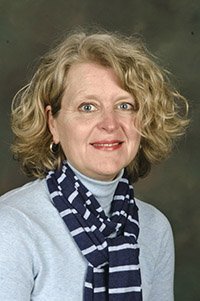
Anne Choquette
Anne Choquette
Ensuring the new Hematology-Oncology Unit and its adjoining Day Centre meets the unique needs of patients, their families and staff members at the new Montreal Children’s Hospital on the Glen site has been a labour of love for clinical nurse specialist (CNS) Anne Choquette.
Since the unveiling of the initial architectural plans, Choquette has been responsible for ensuring that the architects and planners involved in the construction and design of the space understand how the department works and are sensitive to the needs of its patients.
“It’s an incredibly enriching experience,” she says, “the opportunity to be involved in such a major project only comes along once in a lifetime. I am very happy to be a part of it.”
While she admits that at times, a challenge as great as rethinking the way we work as nurses can generate a bit of uncertainty, she has welcomed the challenge of finding common ground with colleagues from both within and outside of her department through ongoing dialogue.
“It’s entirely normal that people fear change and its impacts,” she says. “My role in taking on this new responsibility has been to look at some of our practices more closely and suggest changes where there can be improvements as part of a team, and then implement these or explain why we are obligated to abandon the status quo.”
Thanks to her lengthy career at the Children’s, having worked in a variety of departments and units, Choquette says her links with nursing and clinical leadership throughout the hospital has allowed her to solve problems through closer collaboration with others.
“I’m really proud that I was asked to take on this new role and such a great responsibility,” she says, “it has opened up a lot of doors for me and has allowed me to step outside of the walls of my unit and see what innovative things others are doing.”
![]()
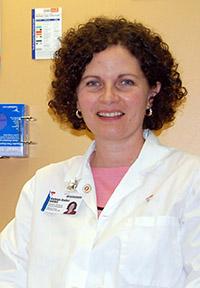
Kathy Riches
Kathy Riches
As a Nurse Clinician in the Adult Outpatient Asthma Clinic at the Montreal Chest Institute (MCI), Kathy Riches looks after asthma patients 17 to 97 years old.
“It’s difficult when a person is diagnosed with a chronic illness. To adapt, you need to understand the condition,” explains Riches. “The key to managing asthma is through education, helping the patient learn to control their symptoms by minimizing exposure to triggers and irritants in their environment and by regularly taking their controller medications.” It’s also important to include the family in the process, because the changes required to manage asthma can have an effect on everyone.
This veteran nurse has worked at the McGill University Health Centre (MUHC) for almost twenty-five years in various capacities. She first got hooked on respiratory medicine when working with respiratory physicians in the outpatient clinics of the Royal Victoria Hospital (RVH), including Dr. Kevin Schwartzman. “Kathy defines patient care in every sense of the phrase,” says Dr. Schwartzman. “She combines total dedication to her patients and colleagues (of every stripe) with unparalleled clinical expertise. And she brings a warmth, kindness and humour that make her a delight to work with.”
Riches often works with other units and external partners, including clinical nutrition, social work, CLSCs, physiotherapy, occupational therapy and inhalation therapy. She appreciates the collaborative atmosphere at the MUHC and is looking forward to being in a new building at the Glen site, in close proximity to the other interdisciplinary teams. As a member of the committee that is responsible for implementing the new appointment booking system at the Glen, she is happy to contribute her clinical expertise to this endeavour.
“I am very happy to work for an organization where nurses are recognized as important team members,” says Riches. “We are encouraged to grow through continuing education and nurtured to keep learning from each other.”.
![]()
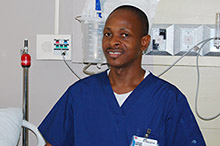
Célestin Ouffoue
Célestin Ouffoue
Célestin Ouffoue started working at the McGill University Health Centre (MUHC) two years ago fresh out of school. His first job was at the Montreal Chest Institute in Acute Respiratory Care and Long-term Care before making the jump to the Medical Surgery Unit at the Lachine Hospital in July 2013. These experiences have taught him different care approaches, tasks and techniques in a short amount of time.
When asked what he likes about his work, he answers “Everything!” with a laugh. “But I think the most satisfying part is seeing someone go home healthy.”
Ouffoue believes that soft skills are complementary to hard skills and that they too contribute to the quality of care, such as being polite and considerate. He makes sure he combines both skill sets when caring for patients. “I try to put myself in patients’ shoes and say something to put them at ease and make them smile,” he says.
He is also a doer. “I start with the premise that following through on the little things lets you manage the big things. If I say I'm going to do something, I do it, no matter what it is,” he says.
Offoue wants to keep looking for learning opportunities so that he can keep developing. He is very satisfied with the trust of his managers along with the challenges they have given him, such as working with day surgery patients or mentoring students. “The people who coach us also fuel our motivation and desire to move forward and provide better care,” he says gratefully.
On a philosophical note, he states that “dreams are what give us a reason to live.” He is on track to finish his undergraduate degree in five years, as he is taking part-time courses at Université de Montréal. One day he'd also like to conduct research: “Yet another reason why I chose the MUHC.”
![]()
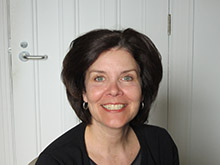
Debbie Watson
Debbie Watson
Inspired to enter nursing in the early 1980s by her sister, who was already a nurse, Debbie Watson went on to obtain her Nursing degree at the University of Montreal. She started her career at the McGill University Health Centre (MUHC) in 1986, where she steadily honed her skills.
By 2007, Watson was asked to participate in a new pilot project spearheaded by an MUHC multidisciplinary team that wanted to create and implement care pathways for Enhanced Recovery After Surgery (ERAS). With Watson’s help the project has become an ongoing educational initiative and was chosen as one of six projects singled out for recognition of best practice during the 2013 MUHC Accreditation Canada exercise. It has become a key element in the MUHC 2015 Transition toward evidence-based practice.
Working with McGill Molson Medical Informatics, Watson helps incorporate research-based findings into the writing and illustration of patient education booklets as part of the ERAS project. These booklets provide patients undergoing day surgery with everything they need to know before they come to the hospital, including where/when to arrive, what/who to bring with them, what will happen during a procedure and what to do once they go home.
It is very important that this information be understood by everyone involved with the patient. “For example;” says Watson, “We now know that patients undergoing day surgery do not need to stop taking liquids at midnight. As long as they stop a couple of hours before the procedure they will be fine and not be dehydrated.”
To help ensure that new knowledge does filter throughout the organization, Watson is involved in every phase of the development of the booklets from vetting the effectiveness of the information with real patients, to ensuring that everyone involved, from clinical staff to admitting clerks, are educated about the evidenced-based information in these patient education tools.
“It’s is not an easy task but it is very interesting. I love the blend of creativity and science,” says Watson. “I’m very passionate about it, so much so it doesn’t even feel like work.”
For more information on MUHC’s patient education guides, please visit the MUHC Patient Education Site.
![]()
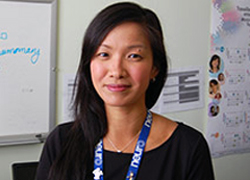
Helen Fong
Helen Fong
For Helen Fong, a nursing professional development educator (NPDE) at the Montreal Neurological Institute and Hospital - The Neuro, being a nurse is all about sharing knowledge, being creative, learning through collaboration and growing together.
"When I came to The Neuro 14 years ago, I fell in love with it,” she says. “The teams were open-minded and willing to help me grow. The whole culture of The Neuro is involved in education."
As a NPDE, Fong's role is to create, support and facilitate education in the face of transition. "We always have to acquire new knowledge and skills, especially in all this change and transition towards MUHC 2015," says Fong. "At the same time, we still have to maintain best practices while creating learning activities and being in tune and listening to what the nurses are saying about their daily needs."
Fong has also been involved in the Clinical Consults and Procedures and the Pharmacy workgroups, where multidisciplinary teams composed of key stakeholders are examining challenges and sharing ideas about proposed solutions, but her greatest challenge is her work on the merger of two units. “Considering the enormity of the change, being a part of the discussion about sustaining best practices and giving the patient the best care, while responding to nurses’ needs, is very humbling," says Fong. "Having the privilege to be a part of it is very inspiring."
![]()
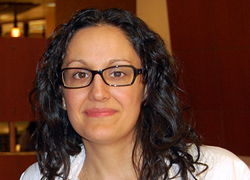
Stella Racaniello
Stella Racaniello
When Stella Racaniello, the patient flow coordinator of surgical services at the Royal Victoria Hospital (RVH) of the McGill University Health Centre (MUHC), comes to work she could start any given day with: 15 patients need surgical beds but only five are available!
“What do I do?,” she asks. "My goal obviously is not only to get all patients admitted to the units in a timely fashion, but to allow for safe patient transfers, so that each individual patient is admitted to the unit with the clinical expertise that best fits the patient's diagnosis and needs. So I take a step back and look at the entire picture of the surgical mission, and start prioritizing."
Racaniello’s role is to manage the flow of patients within the Surgical Mission at the RVH. So any patient that requires a bed within surgery coming in from OR, Recovery Room, Emergency, ICU,other hospitals, clinics, home, etc. At the same time, Stella works in collaboration with the teams of the surgical units for discharge planning and follow ups on patients with increased length of stay.
Racaniello tries to fill the available beds with patients requiring surgery the same day first. She also looks at the requirements of patients coming in from the Emergency Department (ED) and the length of time they have spent there. Racaniello also familiarizes herself with specific tests and procedures in which patients may require prior to discharge home. “I follow up and make sure they get their tests, to allow for quicker discharges, thus improving patient flow.”
Two years ago, part of Ross 5 (13 beds) at the RVH became a Short Term Unit which is open Monday to Friday. Racaniello says that this change has improved patient flow as the multidisciplinary team has become more aware of discharge planning on admission, as the unit is expected to be a 72 hour stay per patient.
“I am very gratified in this position,” says Racaniello. “I don’t have the one-on-one relationship anymore with patients, which I do miss, but it is gratifying in the sense that I will try anything in my day for any given patient to not wait longer than he/she has to. I am at my happiest when no surgical cases are left in the ED, there are no OR surgical cancellations, and patients are at the right place, at the right time, in the right unit, with the right expertise…”
![]()